EDU020X928S: Inclusive Education in Early Childhood Studies
VerifiedAdded on 2022/08/29
|13
|4037
|10
Essay
AI Summary
This essay delves into the discourse surrounding inclusive education, focusing on the role of special schools and the rights of children, particularly within the framework of early childhood studies. It begins by referencing the Universal Declaration of Human Rights and the UN Convention on the Rights of the Child, highlighting the importance of inclusive educational systems. The essay discusses the historical context and evolution of special schools, contrasting their approach with the principles of inclusive education. It explores the benefits of inclusive settings for students with disabilities, emphasizing social skill development, quality of education, and the fulfillment of special educational needs. The essay considers the challenges and resources required for successful inclusion, as well as the cost-effectiveness of inclusive models. Furthermore, it examines the impact of inclusive education on students with various disabilities, including those with autism, speech and communication difficulties, and sensory impairments. The essay also addresses the need for teacher training and technological advancements to support inclusive practices. Finally, it concludes by underscoring the legal and ethical importance of inclusive education and its role in promoting a positive learning environment and enhancing the quality of life for all students. The essay highlights the need for a balanced approach, considering the needs of all students and the importance of specialist support and a well-designed curriculum.
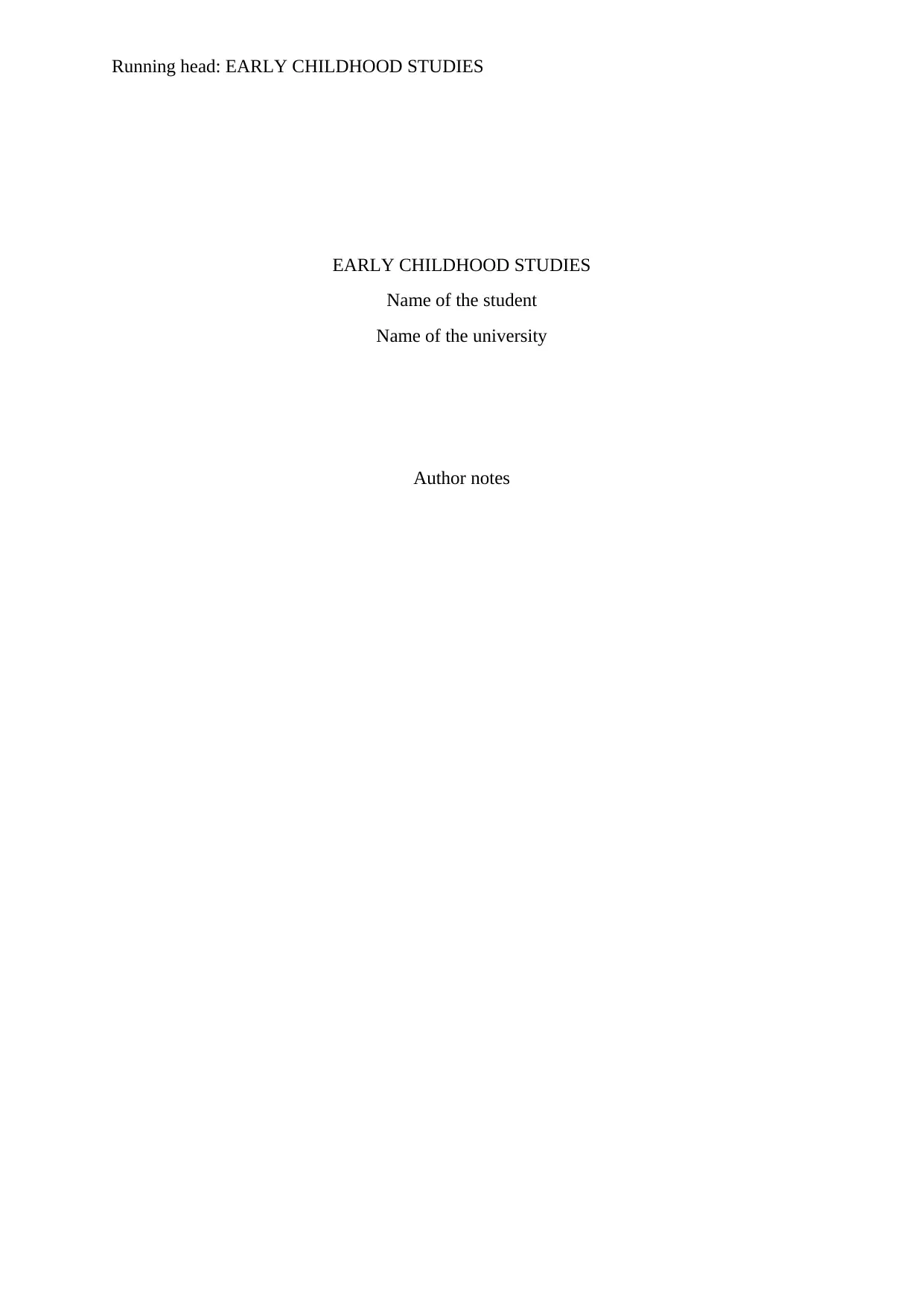
Running head: EARLY CHILDHOOD STUDIES
EARLY CHILDHOOD STUDIES
Name of the student
Name of the university
Author notes
EARLY CHILDHOOD STUDIES
Name of the student
Name of the university
Author notes
Paraphrase This Document
Need a fresh take? Get an instant paraphrase of this document with our AI Paraphraser
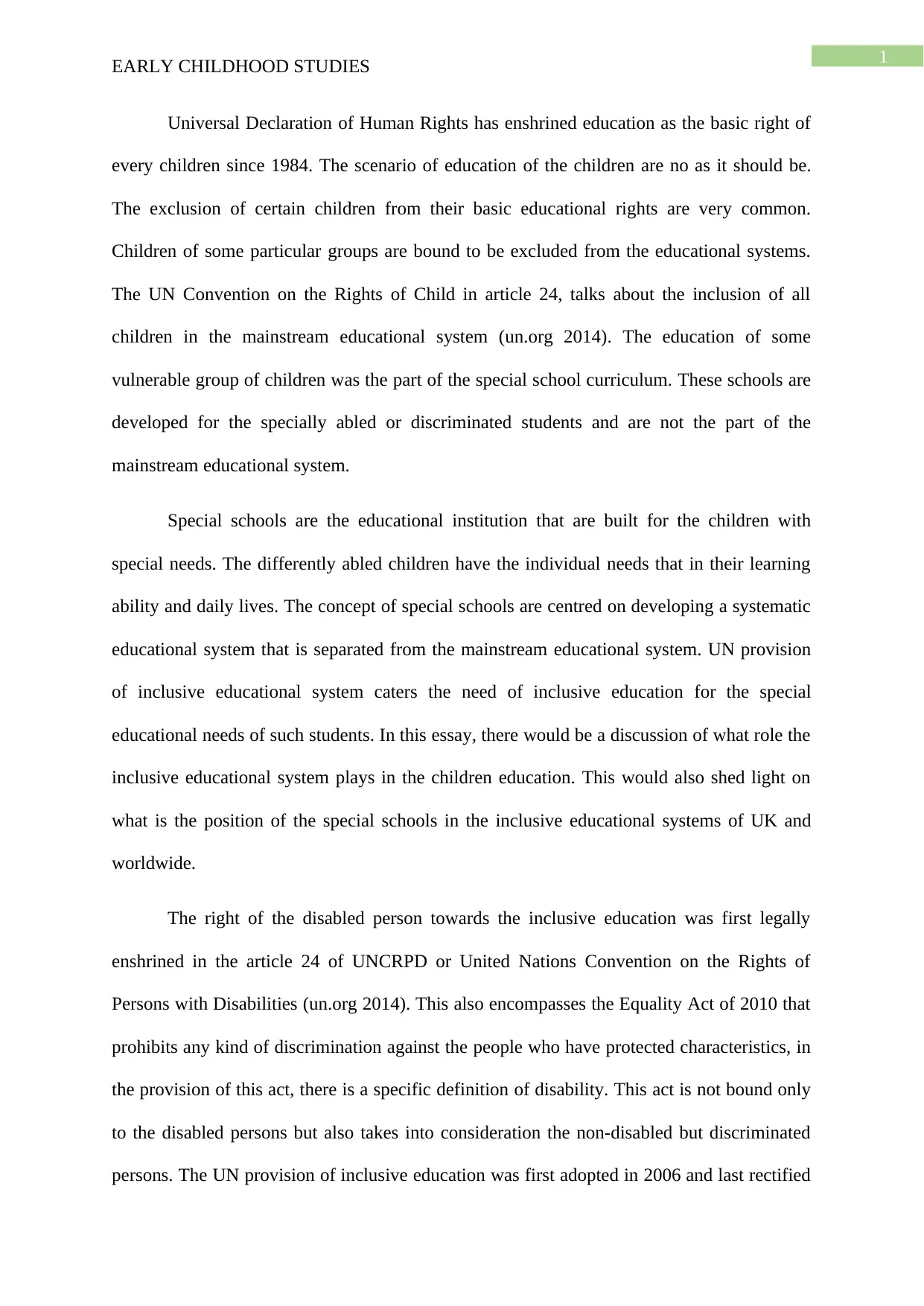
1
EARLY CHILDHOOD STUDIES
Universal Declaration of Human Rights has enshrined education as the basic right of
every children since 1984. The scenario of education of the children are no as it should be.
The exclusion of certain children from their basic educational rights are very common.
Children of some particular groups are bound to be excluded from the educational systems.
The UN Convention on the Rights of Child in article 24, talks about the inclusion of all
children in the mainstream educational system (un.org 2014). The education of some
vulnerable group of children was the part of the special school curriculum. These schools are
developed for the specially abled or discriminated students and are not the part of the
mainstream educational system.
Special schools are the educational institution that are built for the children with
special needs. The differently abled children have the individual needs that in their learning
ability and daily lives. The concept of special schools are centred on developing a systematic
educational system that is separated from the mainstream educational system. UN provision
of inclusive educational system caters the need of inclusive education for the special
educational needs of such students. In this essay, there would be a discussion of what role the
inclusive educational system plays in the children education. This would also shed light on
what is the position of the special schools in the inclusive educational systems of UK and
worldwide.
The right of the disabled person towards the inclusive education was first legally
enshrined in the article 24 of UNCRPD or United Nations Convention on the Rights of
Persons with Disabilities (un.org 2014). This also encompasses the Equality Act of 2010 that
prohibits any kind of discrimination against the people who have protected characteristics, in
the provision of this act, there is a specific definition of disability. This act is not bound only
to the disabled persons but also takes into consideration the non-disabled but discriminated
persons. The UN provision of inclusive education was first adopted in 2006 and last rectified
EARLY CHILDHOOD STUDIES
Universal Declaration of Human Rights has enshrined education as the basic right of
every children since 1984. The scenario of education of the children are no as it should be.
The exclusion of certain children from their basic educational rights are very common.
Children of some particular groups are bound to be excluded from the educational systems.
The UN Convention on the Rights of Child in article 24, talks about the inclusion of all
children in the mainstream educational system (un.org 2014). The education of some
vulnerable group of children was the part of the special school curriculum. These schools are
developed for the specially abled or discriminated students and are not the part of the
mainstream educational system.
Special schools are the educational institution that are built for the children with
special needs. The differently abled children have the individual needs that in their learning
ability and daily lives. The concept of special schools are centred on developing a systematic
educational system that is separated from the mainstream educational system. UN provision
of inclusive educational system caters the need of inclusive education for the special
educational needs of such students. In this essay, there would be a discussion of what role the
inclusive educational system plays in the children education. This would also shed light on
what is the position of the special schools in the inclusive educational systems of UK and
worldwide.
The right of the disabled person towards the inclusive education was first legally
enshrined in the article 24 of UNCRPD or United Nations Convention on the Rights of
Persons with Disabilities (un.org 2014). This also encompasses the Equality Act of 2010 that
prohibits any kind of discrimination against the people who have protected characteristics, in
the provision of this act, there is a specific definition of disability. This act is not bound only
to the disabled persons but also takes into consideration the non-disabled but discriminated
persons. The UN provision of inclusive education was first adopted in 2006 and last rectified
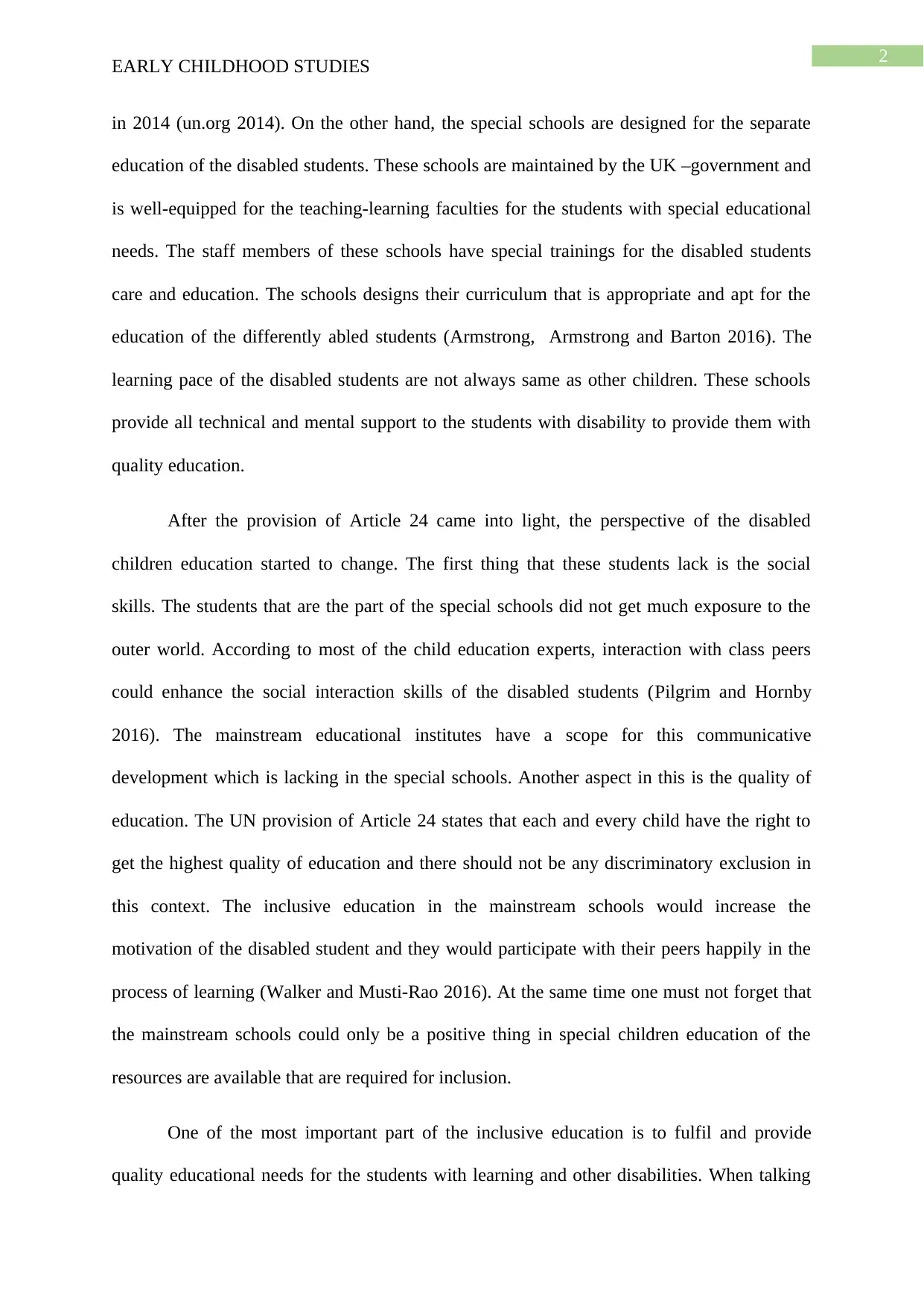
2
EARLY CHILDHOOD STUDIES
in 2014 (un.org 2014). On the other hand, the special schools are designed for the separate
education of the disabled students. These schools are maintained by the UK –government and
is well-equipped for the teaching-learning faculties for the students with special educational
needs. The staff members of these schools have special trainings for the disabled students
care and education. The schools designs their curriculum that is appropriate and apt for the
education of the differently abled students (Armstrong, Armstrong and Barton 2016). The
learning pace of the disabled students are not always same as other children. These schools
provide all technical and mental support to the students with disability to provide them with
quality education.
After the provision of Article 24 came into light, the perspective of the disabled
children education started to change. The first thing that these students lack is the social
skills. The students that are the part of the special schools did not get much exposure to the
outer world. According to most of the child education experts, interaction with class peers
could enhance the social interaction skills of the disabled students (Pilgrim and Hornby
2016). The mainstream educational institutes have a scope for this communicative
development which is lacking in the special schools. Another aspect in this is the quality of
education. The UN provision of Article 24 states that each and every child have the right to
get the highest quality of education and there should not be any discriminatory exclusion in
this context. The inclusive education in the mainstream schools would increase the
motivation of the disabled student and they would participate with their peers happily in the
process of learning (Walker and Musti-Rao 2016). At the same time one must not forget that
the mainstream schools could only be a positive thing in special children education of the
resources are available that are required for inclusion.
One of the most important part of the inclusive education is to fulfil and provide
quality educational needs for the students with learning and other disabilities. When talking
EARLY CHILDHOOD STUDIES
in 2014 (un.org 2014). On the other hand, the special schools are designed for the separate
education of the disabled students. These schools are maintained by the UK –government and
is well-equipped for the teaching-learning faculties for the students with special educational
needs. The staff members of these schools have special trainings for the disabled students
care and education. The schools designs their curriculum that is appropriate and apt for the
education of the differently abled students (Armstrong, Armstrong and Barton 2016). The
learning pace of the disabled students are not always same as other children. These schools
provide all technical and mental support to the students with disability to provide them with
quality education.
After the provision of Article 24 came into light, the perspective of the disabled
children education started to change. The first thing that these students lack is the social
skills. The students that are the part of the special schools did not get much exposure to the
outer world. According to most of the child education experts, interaction with class peers
could enhance the social interaction skills of the disabled students (Pilgrim and Hornby
2016). The mainstream educational institutes have a scope for this communicative
development which is lacking in the special schools. Another aspect in this is the quality of
education. The UN provision of Article 24 states that each and every child have the right to
get the highest quality of education and there should not be any discriminatory exclusion in
this context. The inclusive education in the mainstream schools would increase the
motivation of the disabled student and they would participate with their peers happily in the
process of learning (Walker and Musti-Rao 2016). At the same time one must not forget that
the mainstream schools could only be a positive thing in special children education of the
resources are available that are required for inclusion.
One of the most important part of the inclusive education is to fulfil and provide
quality educational needs for the students with learning and other disabilities. When talking
⊘ This is a preview!⊘
Do you want full access?
Subscribe today to unlock all pages.

Trusted by 1+ million students worldwide
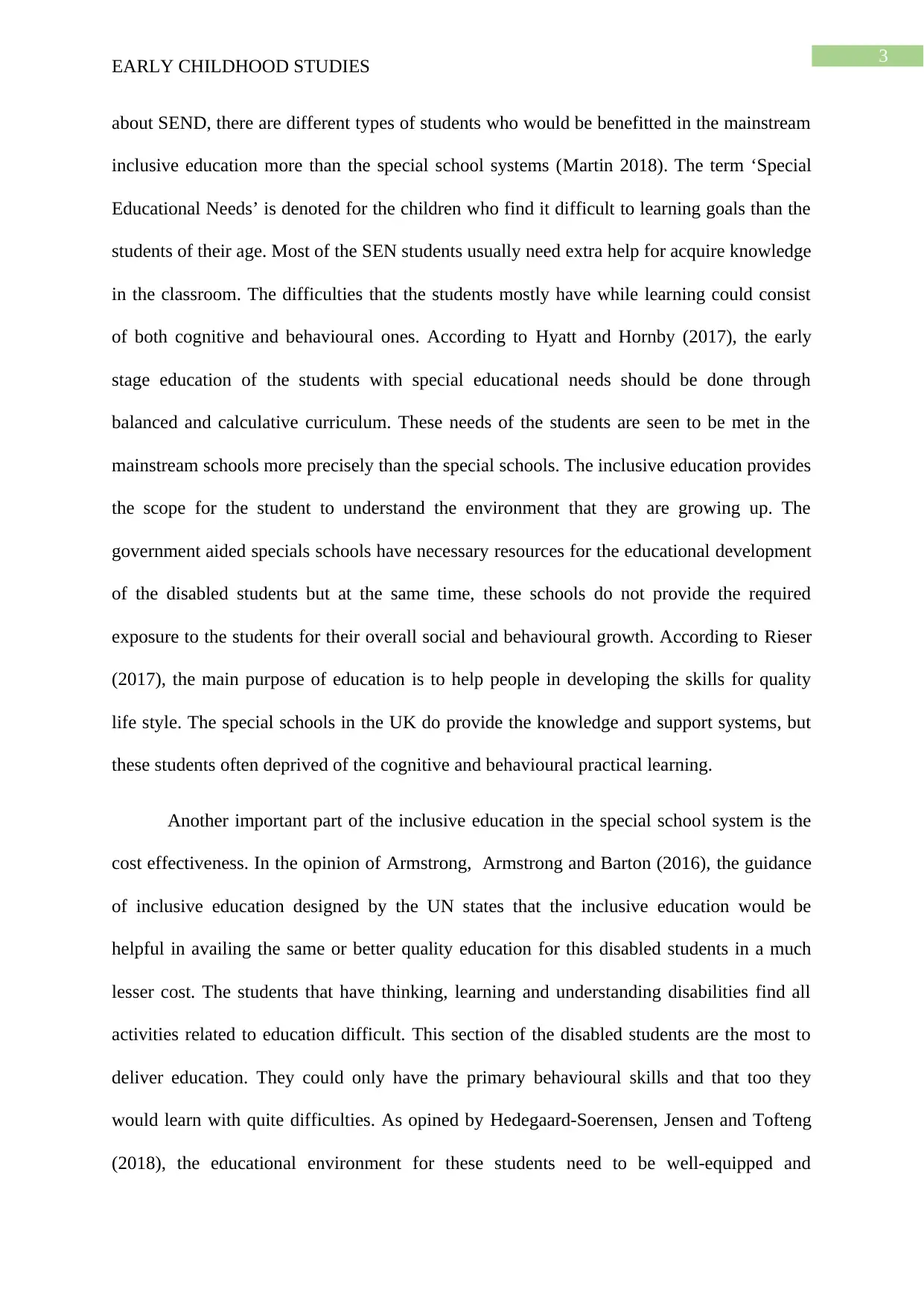
3
EARLY CHILDHOOD STUDIES
about SEND, there are different types of students who would be benefitted in the mainstream
inclusive education more than the special school systems (Martin 2018). The term ‘Special
Educational Needs’ is denoted for the children who find it difficult to learning goals than the
students of their age. Most of the SEN students usually need extra help for acquire knowledge
in the classroom. The difficulties that the students mostly have while learning could consist
of both cognitive and behavioural ones. According to Hyatt and Hornby (2017), the early
stage education of the students with special educational needs should be done through
balanced and calculative curriculum. These needs of the students are seen to be met in the
mainstream schools more precisely than the special schools. The inclusive education provides
the scope for the student to understand the environment that they are growing up. The
government aided specials schools have necessary resources for the educational development
of the disabled students but at the same time, these schools do not provide the required
exposure to the students for their overall social and behavioural growth. According to Rieser
(2017), the main purpose of education is to help people in developing the skills for quality
life style. The special schools in the UK do provide the knowledge and support systems, but
these students often deprived of the cognitive and behavioural practical learning.
Another important part of the inclusive education in the special school system is the
cost effectiveness. In the opinion of Armstrong, Armstrong and Barton (2016), the guidance
of inclusive education designed by the UN states that the inclusive education would be
helpful in availing the same or better quality education for this disabled students in a much
lesser cost. The students that have thinking, learning and understanding disabilities find all
activities related to education difficult. This section of the disabled students are the most to
deliver education. They could only have the primary behavioural skills and that too they
would learn with quite difficulties. As opined by Hedegaard-Soerensen, Jensen and Tofteng
(2018), the educational environment for these students need to be well-equipped and
EARLY CHILDHOOD STUDIES
about SEND, there are different types of students who would be benefitted in the mainstream
inclusive education more than the special school systems (Martin 2018). The term ‘Special
Educational Needs’ is denoted for the children who find it difficult to learning goals than the
students of their age. Most of the SEN students usually need extra help for acquire knowledge
in the classroom. The difficulties that the students mostly have while learning could consist
of both cognitive and behavioural ones. According to Hyatt and Hornby (2017), the early
stage education of the students with special educational needs should be done through
balanced and calculative curriculum. These needs of the students are seen to be met in the
mainstream schools more precisely than the special schools. The inclusive education provides
the scope for the student to understand the environment that they are growing up. The
government aided specials schools have necessary resources for the educational development
of the disabled students but at the same time, these schools do not provide the required
exposure to the students for their overall social and behavioural growth. According to Rieser
(2017), the main purpose of education is to help people in developing the skills for quality
life style. The special schools in the UK do provide the knowledge and support systems, but
these students often deprived of the cognitive and behavioural practical learning.
Another important part of the inclusive education in the special school system is the
cost effectiveness. In the opinion of Armstrong, Armstrong and Barton (2016), the guidance
of inclusive education designed by the UN states that the inclusive education would be
helpful in availing the same or better quality education for this disabled students in a much
lesser cost. The students that have thinking, learning and understanding disabilities find all
activities related to education difficult. This section of the disabled students are the most to
deliver education. They could only have the primary behavioural skills and that too they
would learn with quite difficulties. As opined by Hedegaard-Soerensen, Jensen and Tofteng
(2018), the educational environment for these students need to be well-equipped and
Paraphrase This Document
Need a fresh take? Get an instant paraphrase of this document with our AI Paraphraser
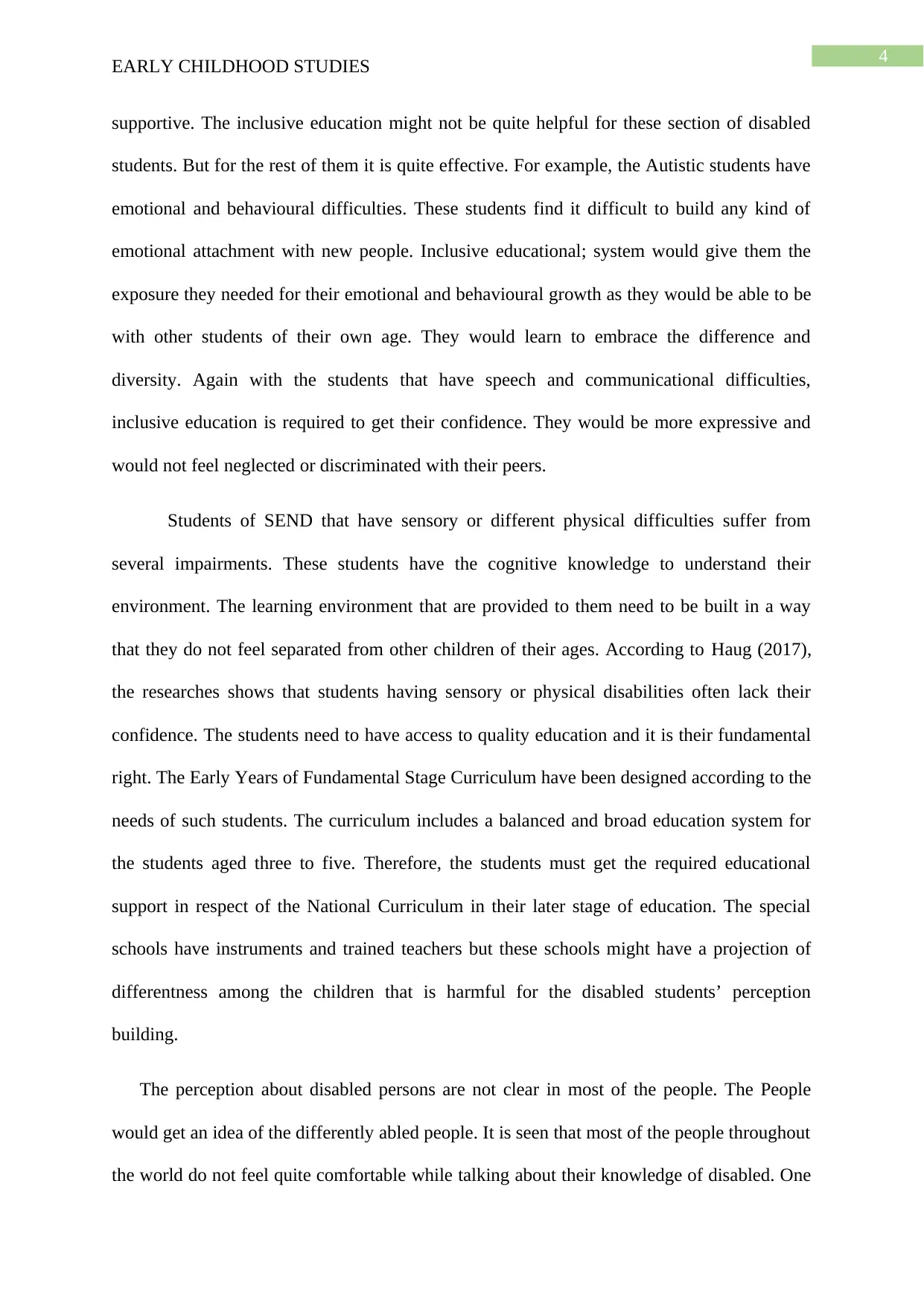
4
EARLY CHILDHOOD STUDIES
supportive. The inclusive education might not be quite helpful for these section of disabled
students. But for the rest of them it is quite effective. For example, the Autistic students have
emotional and behavioural difficulties. These students find it difficult to build any kind of
emotional attachment with new people. Inclusive educational; system would give them the
exposure they needed for their emotional and behavioural growth as they would be able to be
with other students of their own age. They would learn to embrace the difference and
diversity. Again with the students that have speech and communicational difficulties,
inclusive education is required to get their confidence. They would be more expressive and
would not feel neglected or discriminated with their peers.
Students of SEND that have sensory or different physical difficulties suffer from
several impairments. These students have the cognitive knowledge to understand their
environment. The learning environment that are provided to them need to be built in a way
that they do not feel separated from other children of their ages. According to Haug (2017),
the researches shows that students having sensory or physical disabilities often lack their
confidence. The students need to have access to quality education and it is their fundamental
right. The Early Years of Fundamental Stage Curriculum have been designed according to the
needs of such students. The curriculum includes a balanced and broad education system for
the students aged three to five. Therefore, the students must get the required educational
support in respect of the National Curriculum in their later stage of education. The special
schools have instruments and trained teachers but these schools might have a projection of
differentness among the children that is harmful for the disabled students’ perception
building.
The perception about disabled persons are not clear in most of the people. The People
would get an idea of the differently abled people. It is seen that most of the people throughout
the world do not feel quite comfortable while talking about their knowledge of disabled. One
EARLY CHILDHOOD STUDIES
supportive. The inclusive education might not be quite helpful for these section of disabled
students. But for the rest of them it is quite effective. For example, the Autistic students have
emotional and behavioural difficulties. These students find it difficult to build any kind of
emotional attachment with new people. Inclusive educational; system would give them the
exposure they needed for their emotional and behavioural growth as they would be able to be
with other students of their own age. They would learn to embrace the difference and
diversity. Again with the students that have speech and communicational difficulties,
inclusive education is required to get their confidence. They would be more expressive and
would not feel neglected or discriminated with their peers.
Students of SEND that have sensory or different physical difficulties suffer from
several impairments. These students have the cognitive knowledge to understand their
environment. The learning environment that are provided to them need to be built in a way
that they do not feel separated from other children of their ages. According to Haug (2017),
the researches shows that students having sensory or physical disabilities often lack their
confidence. The students need to have access to quality education and it is their fundamental
right. The Early Years of Fundamental Stage Curriculum have been designed according to the
needs of such students. The curriculum includes a balanced and broad education system for
the students aged three to five. Therefore, the students must get the required educational
support in respect of the National Curriculum in their later stage of education. The special
schools have instruments and trained teachers but these schools might have a projection of
differentness among the children that is harmful for the disabled students’ perception
building.
The perception about disabled persons are not clear in most of the people. The People
would get an idea of the differently abled people. It is seen that most of the people throughout
the world do not feel quite comfortable while talking about their knowledge of disabled. One
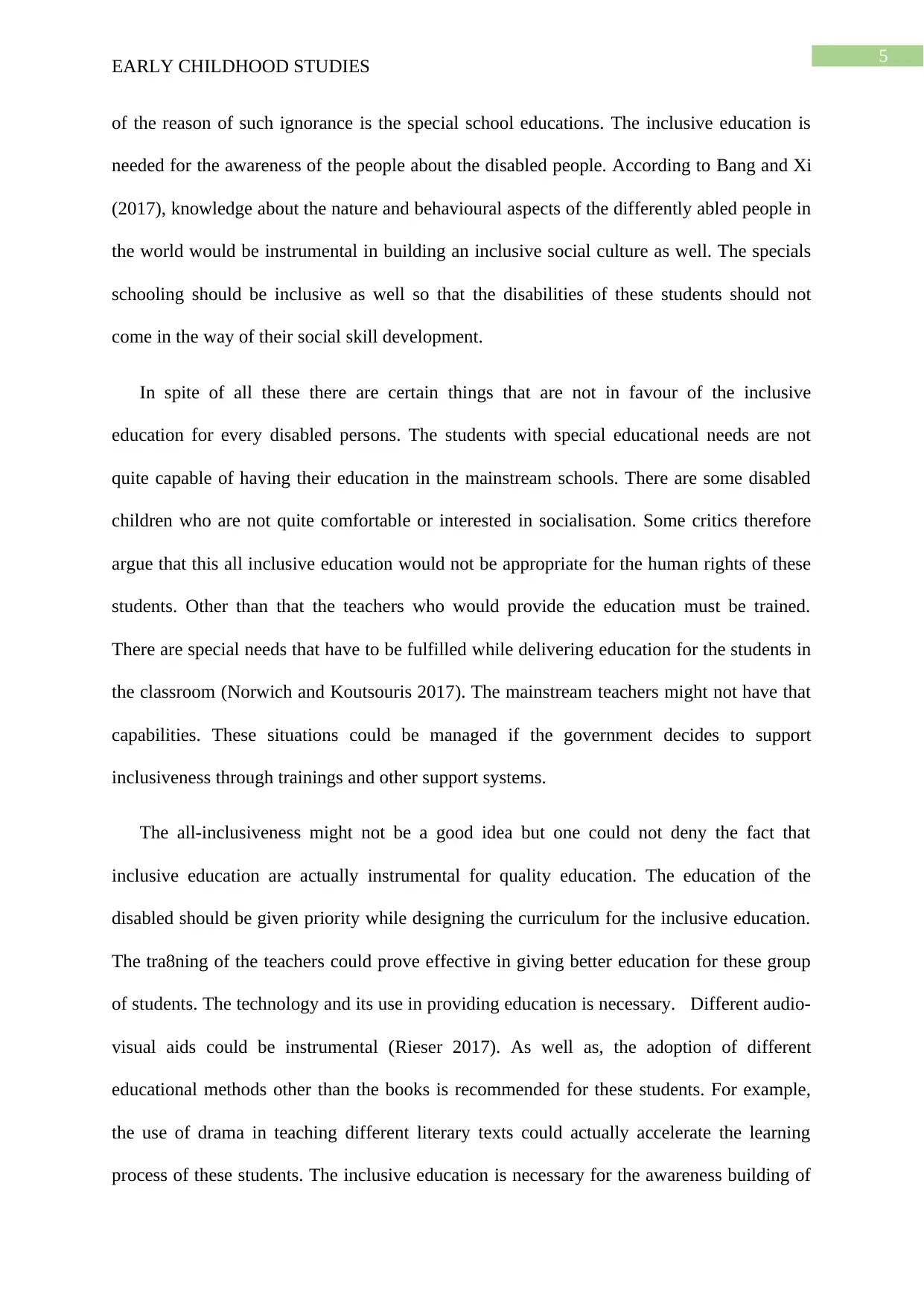
5
EARLY CHILDHOOD STUDIES
of the reason of such ignorance is the special school educations. The inclusive education is
needed for the awareness of the people about the disabled people. According to Bang and Xi
(2017), knowledge about the nature and behavioural aspects of the differently abled people in
the world would be instrumental in building an inclusive social culture as well. The specials
schooling should be inclusive as well so that the disabilities of these students should not
come in the way of their social skill development.
In spite of all these there are certain things that are not in favour of the inclusive
education for every disabled persons. The students with special educational needs are not
quite capable of having their education in the mainstream schools. There are some disabled
children who are not quite comfortable or interested in socialisation. Some critics therefore
argue that this all inclusive education would not be appropriate for the human rights of these
students. Other than that the teachers who would provide the education must be trained.
There are special needs that have to be fulfilled while delivering education for the students in
the classroom (Norwich and Koutsouris 2017). The mainstream teachers might not have that
capabilities. These situations could be managed if the government decides to support
inclusiveness through trainings and other support systems.
The all-inclusiveness might not be a good idea but one could not deny the fact that
inclusive education are actually instrumental for quality education. The education of the
disabled should be given priority while designing the curriculum for the inclusive education.
The tra8ning of the teachers could prove effective in giving better education for these group
of students. The technology and its use in providing education is necessary. Different audio-
visual aids could be instrumental (Rieser 2017). As well as, the adoption of different
educational methods other than the books is recommended for these students. For example,
the use of drama in teaching different literary texts could actually accelerate the learning
process of these students. The inclusive education is necessary for the awareness building of
EARLY CHILDHOOD STUDIES
of the reason of such ignorance is the special school educations. The inclusive education is
needed for the awareness of the people about the disabled people. According to Bang and Xi
(2017), knowledge about the nature and behavioural aspects of the differently abled people in
the world would be instrumental in building an inclusive social culture as well. The specials
schooling should be inclusive as well so that the disabilities of these students should not
come in the way of their social skill development.
In spite of all these there are certain things that are not in favour of the inclusive
education for every disabled persons. The students with special educational needs are not
quite capable of having their education in the mainstream schools. There are some disabled
children who are not quite comfortable or interested in socialisation. Some critics therefore
argue that this all inclusive education would not be appropriate for the human rights of these
students. Other than that the teachers who would provide the education must be trained.
There are special needs that have to be fulfilled while delivering education for the students in
the classroom (Norwich and Koutsouris 2017). The mainstream teachers might not have that
capabilities. These situations could be managed if the government decides to support
inclusiveness through trainings and other support systems.
The all-inclusiveness might not be a good idea but one could not deny the fact that
inclusive education are actually instrumental for quality education. The education of the
disabled should be given priority while designing the curriculum for the inclusive education.
The tra8ning of the teachers could prove effective in giving better education for these group
of students. The technology and its use in providing education is necessary. Different audio-
visual aids could be instrumental (Rieser 2017). As well as, the adoption of different
educational methods other than the books is recommended for these students. For example,
the use of drama in teaching different literary texts could actually accelerate the learning
process of these students. The inclusive education is necessary for the awareness building of
⊘ This is a preview!⊘
Do you want full access?
Subscribe today to unlock all pages.

Trusted by 1+ million students worldwide
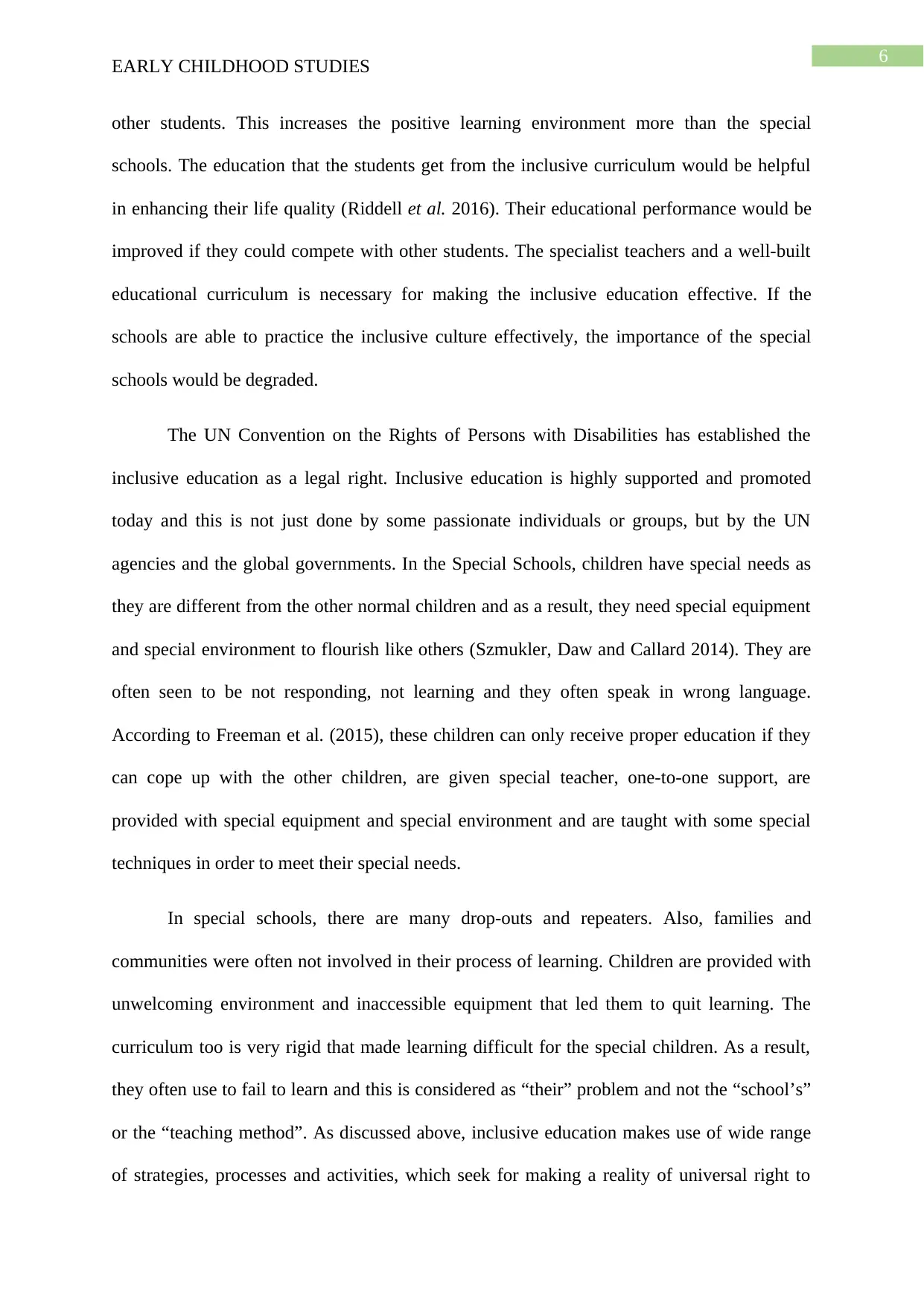
6
EARLY CHILDHOOD STUDIES
other students. This increases the positive learning environment more than the special
schools. The education that the students get from the inclusive curriculum would be helpful
in enhancing their life quality (Riddell et al. 2016). Their educational performance would be
improved if they could compete with other students. The specialist teachers and a well-built
educational curriculum is necessary for making the inclusive education effective. If the
schools are able to practice the inclusive culture effectively, the importance of the special
schools would be degraded.
The UN Convention on the Rights of Persons with Disabilities has established the
inclusive education as a legal right. Inclusive education is highly supported and promoted
today and this is not just done by some passionate individuals or groups, but by the UN
agencies and the global governments. In the Special Schools, children have special needs as
they are different from the other normal children and as a result, they need special equipment
and special environment to flourish like others (Szmukler, Daw and Callard 2014). They are
often seen to be not responding, not learning and they often speak in wrong language.
According to Freeman et al. (2015), these children can only receive proper education if they
can cope up with the other children, are given special teacher, one-to-one support, are
provided with special equipment and special environment and are taught with some special
techniques in order to meet their special needs.
In special schools, there are many drop-outs and repeaters. Also, families and
communities were often not involved in their process of learning. Children are provided with
unwelcoming environment and inaccessible equipment that led them to quit learning. The
curriculum too is very rigid that made learning difficult for the special children. As a result,
they often use to fail to learn and this is considered as “their” problem and not the “school’s”
or the “teaching method”. As discussed above, inclusive education makes use of wide range
of strategies, processes and activities, which seek for making a reality of universal right to
EARLY CHILDHOOD STUDIES
other students. This increases the positive learning environment more than the special
schools. The education that the students get from the inclusive curriculum would be helpful
in enhancing their life quality (Riddell et al. 2016). Their educational performance would be
improved if they could compete with other students. The specialist teachers and a well-built
educational curriculum is necessary for making the inclusive education effective. If the
schools are able to practice the inclusive culture effectively, the importance of the special
schools would be degraded.
The UN Convention on the Rights of Persons with Disabilities has established the
inclusive education as a legal right. Inclusive education is highly supported and promoted
today and this is not just done by some passionate individuals or groups, but by the UN
agencies and the global governments. In the Special Schools, children have special needs as
they are different from the other normal children and as a result, they need special equipment
and special environment to flourish like others (Szmukler, Daw and Callard 2014). They are
often seen to be not responding, not learning and they often speak in wrong language.
According to Freeman et al. (2015), these children can only receive proper education if they
can cope up with the other children, are given special teacher, one-to-one support, are
provided with special equipment and special environment and are taught with some special
techniques in order to meet their special needs.
In special schools, there are many drop-outs and repeaters. Also, families and
communities were often not involved in their process of learning. Children are provided with
unwelcoming environment and inaccessible equipment that led them to quit learning. The
curriculum too is very rigid that made learning difficult for the special children. As a result,
they often use to fail to learn and this is considered as “their” problem and not the “school’s”
or the “teaching method”. As discussed above, inclusive education makes use of wide range
of strategies, processes and activities, which seek for making a reality of universal right to
Paraphrase This Document
Need a fresh take? Get an instant paraphrase of this document with our AI Paraphraser
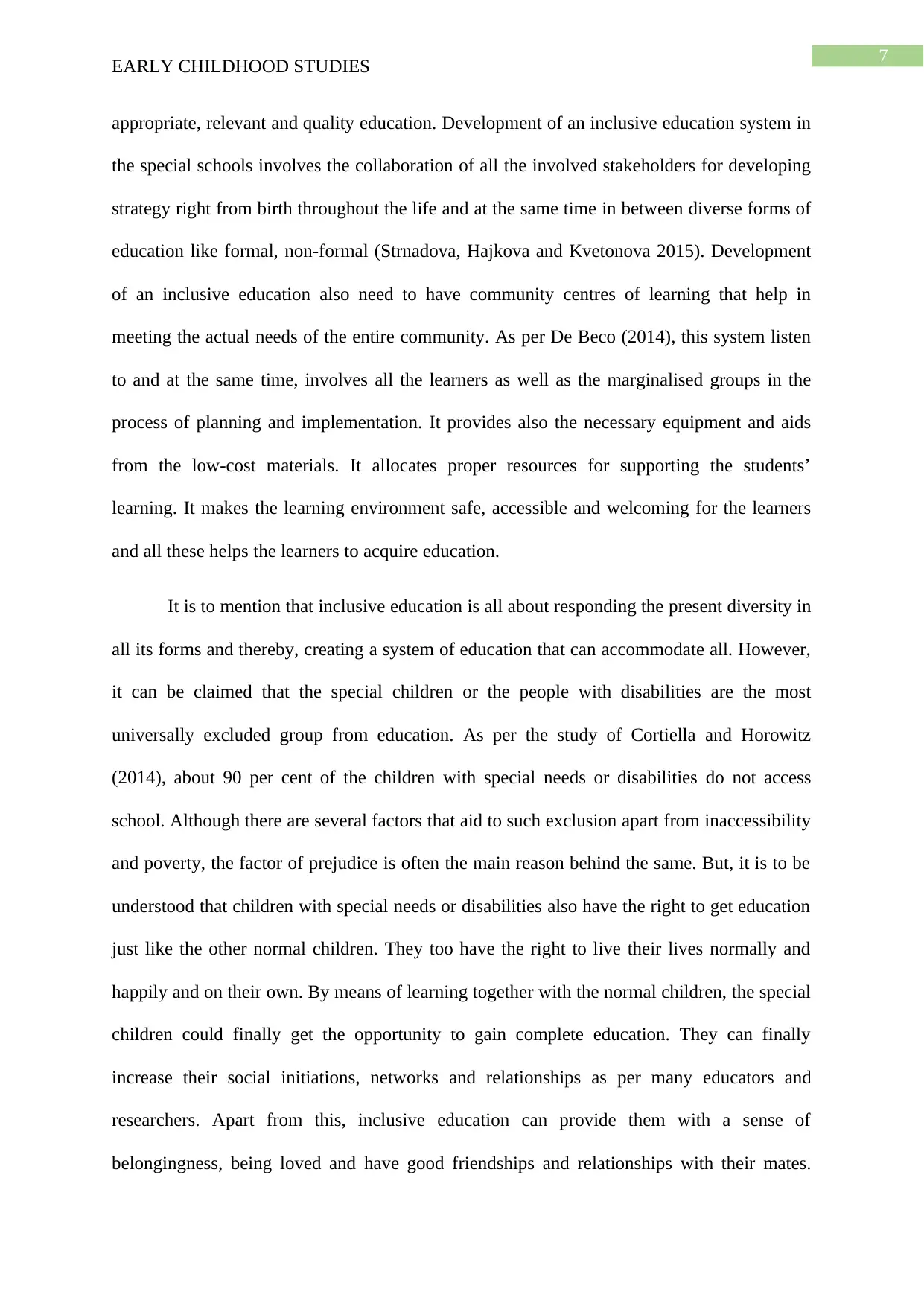
7
EARLY CHILDHOOD STUDIES
appropriate, relevant and quality education. Development of an inclusive education system in
the special schools involves the collaboration of all the involved stakeholders for developing
strategy right from birth throughout the life and at the same time in between diverse forms of
education like formal, non-formal (Strnadova, Hajkova and Kvetonova 2015). Development
of an inclusive education also need to have community centres of learning that help in
meeting the actual needs of the entire community. As per De Beco (2014), this system listen
to and at the same time, involves all the learners as well as the marginalised groups in the
process of planning and implementation. It provides also the necessary equipment and aids
from the low-cost materials. It allocates proper resources for supporting the students’
learning. It makes the learning environment safe, accessible and welcoming for the learners
and all these helps the learners to acquire education.
It is to mention that inclusive education is all about responding the present diversity in
all its forms and thereby, creating a system of education that can accommodate all. However,
it can be claimed that the special children or the people with disabilities are the most
universally excluded group from education. As per the study of Cortiella and Horowitz
(2014), about 90 per cent of the children with special needs or disabilities do not access
school. Although there are several factors that aid to such exclusion apart from inaccessibility
and poverty, the factor of prejudice is often the main reason behind the same. But, it is to be
understood that children with special needs or disabilities also have the right to get education
just like the other normal children. They too have the right to live their lives normally and
happily and on their own. By means of learning together with the normal children, the special
children could finally get the opportunity to gain complete education. They can finally
increase their social initiations, networks and relationships as per many educators and
researchers. Apart from this, inclusive education can provide them with a sense of
belongingness, being loved and have good friendships and relationships with their mates.
EARLY CHILDHOOD STUDIES
appropriate, relevant and quality education. Development of an inclusive education system in
the special schools involves the collaboration of all the involved stakeholders for developing
strategy right from birth throughout the life and at the same time in between diverse forms of
education like formal, non-formal (Strnadova, Hajkova and Kvetonova 2015). Development
of an inclusive education also need to have community centres of learning that help in
meeting the actual needs of the entire community. As per De Beco (2014), this system listen
to and at the same time, involves all the learners as well as the marginalised groups in the
process of planning and implementation. It provides also the necessary equipment and aids
from the low-cost materials. It allocates proper resources for supporting the students’
learning. It makes the learning environment safe, accessible and welcoming for the learners
and all these helps the learners to acquire education.
It is to mention that inclusive education is all about responding the present diversity in
all its forms and thereby, creating a system of education that can accommodate all. However,
it can be claimed that the special children or the people with disabilities are the most
universally excluded group from education. As per the study of Cortiella and Horowitz
(2014), about 90 per cent of the children with special needs or disabilities do not access
school. Although there are several factors that aid to such exclusion apart from inaccessibility
and poverty, the factor of prejudice is often the main reason behind the same. But, it is to be
understood that children with special needs or disabilities also have the right to get education
just like the other normal children. They too have the right to live their lives normally and
happily and on their own. By means of learning together with the normal children, the special
children could finally get the opportunity to gain complete education. They can finally
increase their social initiations, networks and relationships as per many educators and
researchers. Apart from this, inclusive education can provide them with a sense of
belongingness, being loved and have good friendships and relationships with their mates.
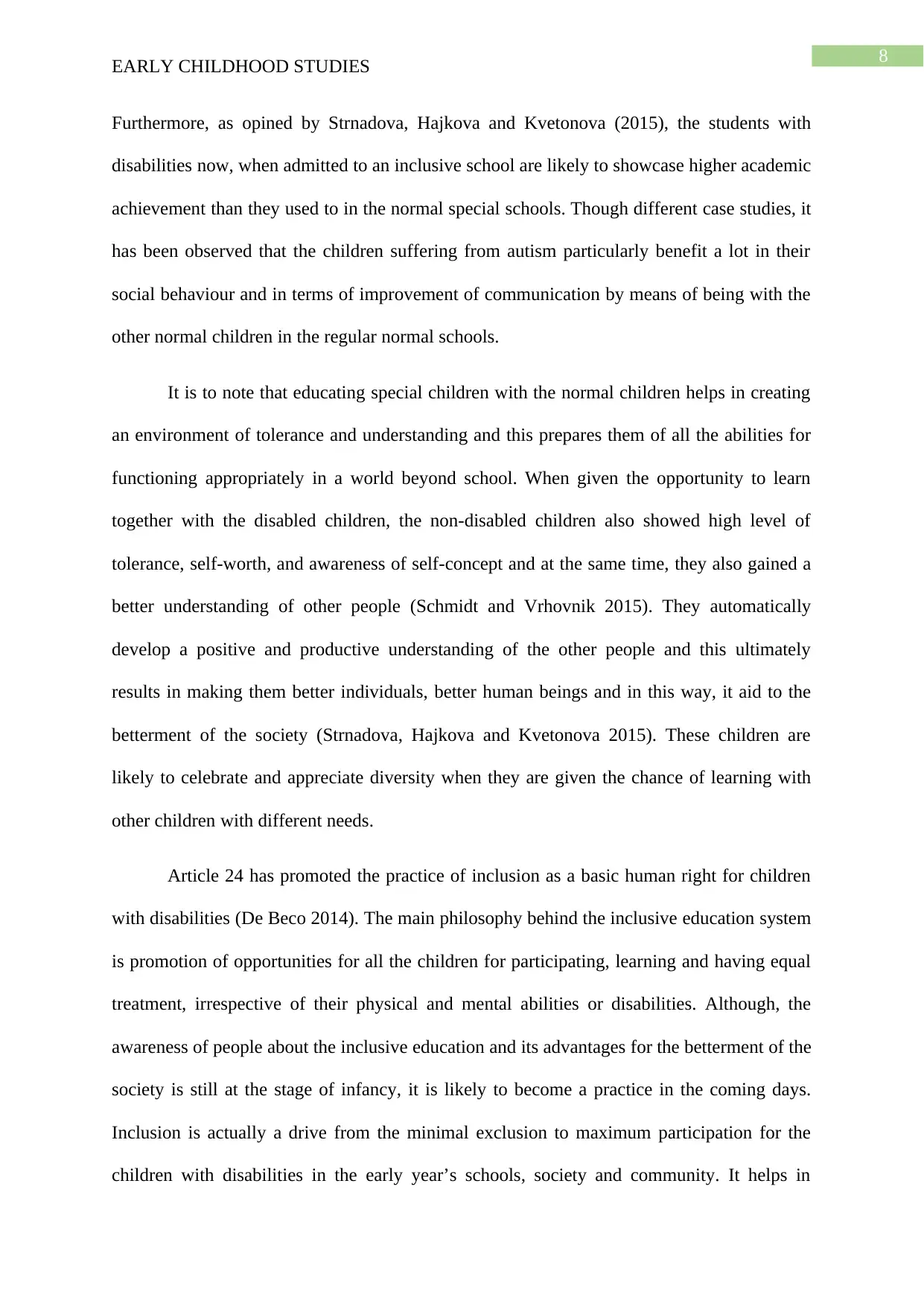
8
EARLY CHILDHOOD STUDIES
Furthermore, as opined by Strnadova, Hajkova and Kvetonova (2015), the students with
disabilities now, when admitted to an inclusive school are likely to showcase higher academic
achievement than they used to in the normal special schools. Though different case studies, it
has been observed that the children suffering from autism particularly benefit a lot in their
social behaviour and in terms of improvement of communication by means of being with the
other normal children in the regular normal schools.
It is to note that educating special children with the normal children helps in creating
an environment of tolerance and understanding and this prepares them of all the abilities for
functioning appropriately in a world beyond school. When given the opportunity to learn
together with the disabled children, the non-disabled children also showed high level of
tolerance, self-worth, and awareness of self-concept and at the same time, they also gained a
better understanding of other people (Schmidt and Vrhovnik 2015). They automatically
develop a positive and productive understanding of the other people and this ultimately
results in making them better individuals, better human beings and in this way, it aid to the
betterment of the society (Strnadova, Hajkova and Kvetonova 2015). These children are
likely to celebrate and appreciate diversity when they are given the chance of learning with
other children with different needs.
Article 24 has promoted the practice of inclusion as a basic human right for children
with disabilities (De Beco 2014). The main philosophy behind the inclusive education system
is promotion of opportunities for all the children for participating, learning and having equal
treatment, irrespective of their physical and mental abilities or disabilities. Although, the
awareness of people about the inclusive education and its advantages for the betterment of the
society is still at the stage of infancy, it is likely to become a practice in the coming days.
Inclusion is actually a drive from the minimal exclusion to maximum participation for the
children with disabilities in the early year’s schools, society and community. It helps in
EARLY CHILDHOOD STUDIES
Furthermore, as opined by Strnadova, Hajkova and Kvetonova (2015), the students with
disabilities now, when admitted to an inclusive school are likely to showcase higher academic
achievement than they used to in the normal special schools. Though different case studies, it
has been observed that the children suffering from autism particularly benefit a lot in their
social behaviour and in terms of improvement of communication by means of being with the
other normal children in the regular normal schools.
It is to note that educating special children with the normal children helps in creating
an environment of tolerance and understanding and this prepares them of all the abilities for
functioning appropriately in a world beyond school. When given the opportunity to learn
together with the disabled children, the non-disabled children also showed high level of
tolerance, self-worth, and awareness of self-concept and at the same time, they also gained a
better understanding of other people (Schmidt and Vrhovnik 2015). They automatically
develop a positive and productive understanding of the other people and this ultimately
results in making them better individuals, better human beings and in this way, it aid to the
betterment of the society (Strnadova, Hajkova and Kvetonova 2015). These children are
likely to celebrate and appreciate diversity when they are given the chance of learning with
other children with different needs.
Article 24 has promoted the practice of inclusion as a basic human right for children
with disabilities (De Beco 2014). The main philosophy behind the inclusive education system
is promotion of opportunities for all the children for participating, learning and having equal
treatment, irrespective of their physical and mental abilities or disabilities. Although, the
awareness of people about the inclusive education and its advantages for the betterment of the
society is still at the stage of infancy, it is likely to become a practice in the coming days.
Inclusion is actually a drive from the minimal exclusion to maximum participation for the
children with disabilities in the early year’s schools, society and community. It helps in
⊘ This is a preview!⊘
Do you want full access?
Subscribe today to unlock all pages.

Trusted by 1+ million students worldwide
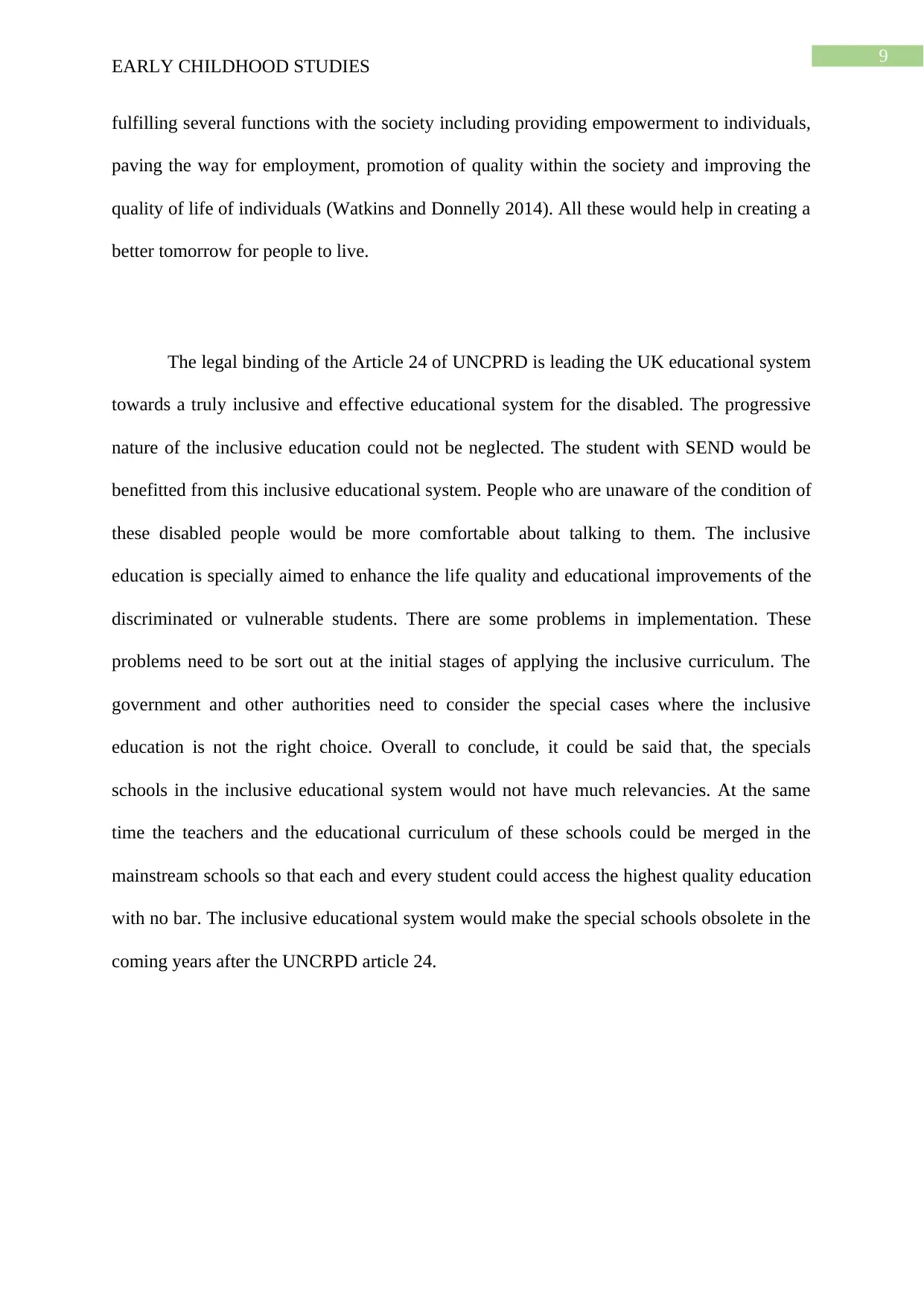
9
EARLY CHILDHOOD STUDIES
fulfilling several functions with the society including providing empowerment to individuals,
paving the way for employment, promotion of quality within the society and improving the
quality of life of individuals (Watkins and Donnelly 2014). All these would help in creating a
better tomorrow for people to live.
The legal binding of the Article 24 of UNCPRD is leading the UK educational system
towards a truly inclusive and effective educational system for the disabled. The progressive
nature of the inclusive education could not be neglected. The student with SEND would be
benefitted from this inclusive educational system. People who are unaware of the condition of
these disabled people would be more comfortable about talking to them. The inclusive
education is specially aimed to enhance the life quality and educational improvements of the
discriminated or vulnerable students. There are some problems in implementation. These
problems need to be sort out at the initial stages of applying the inclusive curriculum. The
government and other authorities need to consider the special cases where the inclusive
education is not the right choice. Overall to conclude, it could be said that, the specials
schools in the inclusive educational system would not have much relevancies. At the same
time the teachers and the educational curriculum of these schools could be merged in the
mainstream schools so that each and every student could access the highest quality education
with no bar. The inclusive educational system would make the special schools obsolete in the
coming years after the UNCRPD article 24.
EARLY CHILDHOOD STUDIES
fulfilling several functions with the society including providing empowerment to individuals,
paving the way for employment, promotion of quality within the society and improving the
quality of life of individuals (Watkins and Donnelly 2014). All these would help in creating a
better tomorrow for people to live.
The legal binding of the Article 24 of UNCPRD is leading the UK educational system
towards a truly inclusive and effective educational system for the disabled. The progressive
nature of the inclusive education could not be neglected. The student with SEND would be
benefitted from this inclusive educational system. People who are unaware of the condition of
these disabled people would be more comfortable about talking to them. The inclusive
education is specially aimed to enhance the life quality and educational improvements of the
discriminated or vulnerable students. There are some problems in implementation. These
problems need to be sort out at the initial stages of applying the inclusive curriculum. The
government and other authorities need to consider the special cases where the inclusive
education is not the right choice. Overall to conclude, it could be said that, the specials
schools in the inclusive educational system would not have much relevancies. At the same
time the teachers and the educational curriculum of these schools could be merged in the
mainstream schools so that each and every student could access the highest quality education
with no bar. The inclusive educational system would make the special schools obsolete in the
coming years after the UNCRPD article 24.
Paraphrase This Document
Need a fresh take? Get an instant paraphrase of this document with our AI Paraphraser
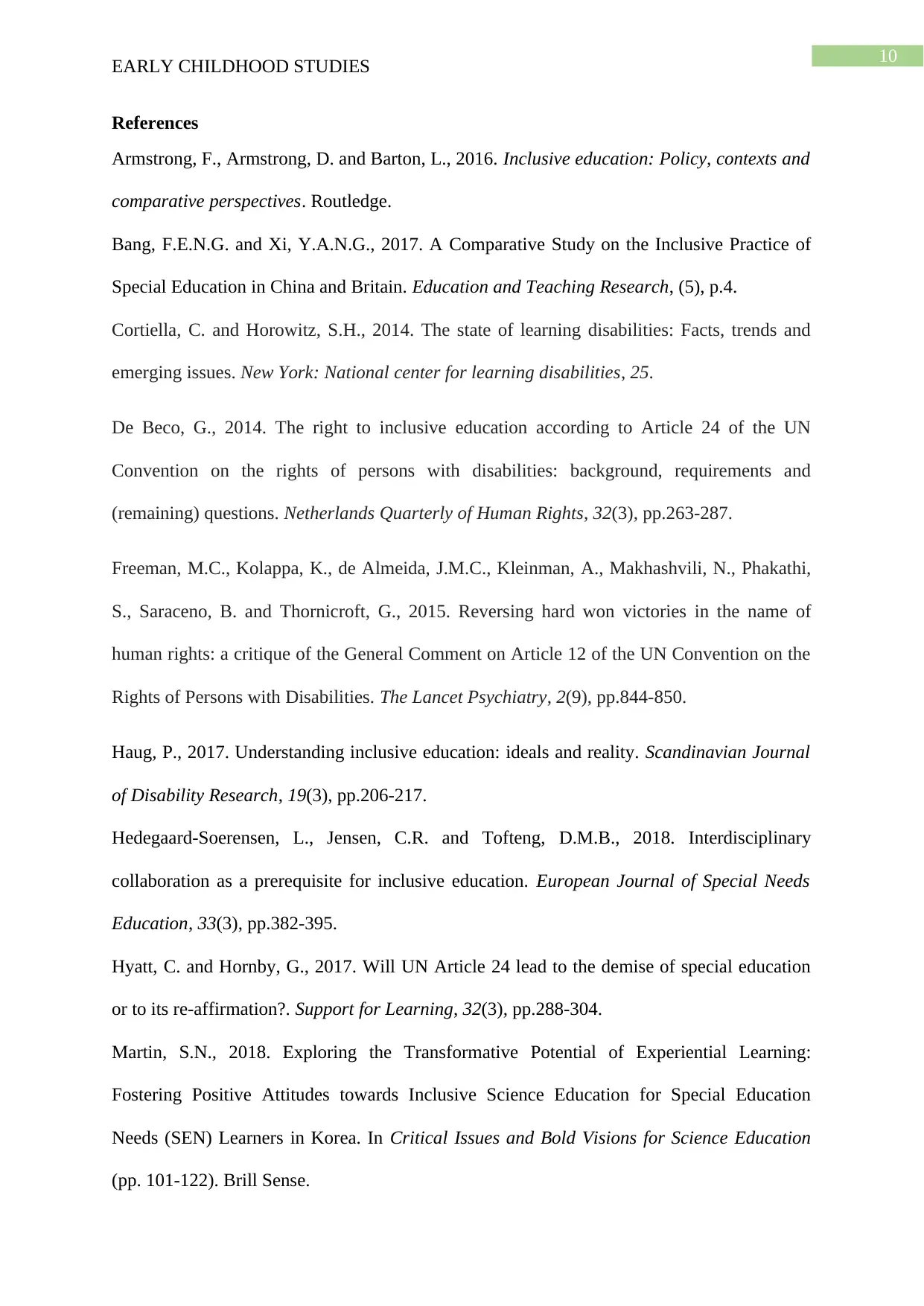
10
EARLY CHILDHOOD STUDIES
References
Armstrong, F., Armstrong, D. and Barton, L., 2016. Inclusive education: Policy, contexts and
comparative perspectives. Routledge.
Bang, F.E.N.G. and Xi, Y.A.N.G., 2017. A Comparative Study on the Inclusive Practice of
Special Education in China and Britain. Education and Teaching Research, (5), p.4.
Cortiella, C. and Horowitz, S.H., 2014. The state of learning disabilities: Facts, trends and
emerging issues. New York: National center for learning disabilities, 25.
De Beco, G., 2014. The right to inclusive education according to Article 24 of the UN
Convention on the rights of persons with disabilities: background, requirements and
(remaining) questions. Netherlands Quarterly of Human Rights, 32(3), pp.263-287.
Freeman, M.C., Kolappa, K., de Almeida, J.M.C., Kleinman, A., Makhashvili, N., Phakathi,
S., Saraceno, B. and Thornicroft, G., 2015. Reversing hard won victories in the name of
human rights: a critique of the General Comment on Article 12 of the UN Convention on the
Rights of Persons with Disabilities. The Lancet Psychiatry, 2(9), pp.844-850.
Haug, P., 2017. Understanding inclusive education: ideals and reality. Scandinavian Journal
of Disability Research, 19(3), pp.206-217.
Hedegaard-Soerensen, L., Jensen, C.R. and Tofteng, D.M.B., 2018. Interdisciplinary
collaboration as a prerequisite for inclusive education. European Journal of Special Needs
Education, 33(3), pp.382-395.
Hyatt, C. and Hornby, G., 2017. Will UN Article 24 lead to the demise of special education
or to its re‐affirmation?. Support for Learning, 32(3), pp.288-304.
Martin, S.N., 2018. Exploring the Transformative Potential of Experiential Learning:
Fostering Positive Attitudes towards Inclusive Science Education for Special Education
Needs (SEN) Learners in Korea. In Critical Issues and Bold Visions for Science Education
(pp. 101-122). Brill Sense.
EARLY CHILDHOOD STUDIES
References
Armstrong, F., Armstrong, D. and Barton, L., 2016. Inclusive education: Policy, contexts and
comparative perspectives. Routledge.
Bang, F.E.N.G. and Xi, Y.A.N.G., 2017. A Comparative Study on the Inclusive Practice of
Special Education in China and Britain. Education and Teaching Research, (5), p.4.
Cortiella, C. and Horowitz, S.H., 2014. The state of learning disabilities: Facts, trends and
emerging issues. New York: National center for learning disabilities, 25.
De Beco, G., 2014. The right to inclusive education according to Article 24 of the UN
Convention on the rights of persons with disabilities: background, requirements and
(remaining) questions. Netherlands Quarterly of Human Rights, 32(3), pp.263-287.
Freeman, M.C., Kolappa, K., de Almeida, J.M.C., Kleinman, A., Makhashvili, N., Phakathi,
S., Saraceno, B. and Thornicroft, G., 2015. Reversing hard won victories in the name of
human rights: a critique of the General Comment on Article 12 of the UN Convention on the
Rights of Persons with Disabilities. The Lancet Psychiatry, 2(9), pp.844-850.
Haug, P., 2017. Understanding inclusive education: ideals and reality. Scandinavian Journal
of Disability Research, 19(3), pp.206-217.
Hedegaard-Soerensen, L., Jensen, C.R. and Tofteng, D.M.B., 2018. Interdisciplinary
collaboration as a prerequisite for inclusive education. European Journal of Special Needs
Education, 33(3), pp.382-395.
Hyatt, C. and Hornby, G., 2017. Will UN Article 24 lead to the demise of special education
or to its re‐affirmation?. Support for Learning, 32(3), pp.288-304.
Martin, S.N., 2018. Exploring the Transformative Potential of Experiential Learning:
Fostering Positive Attitudes towards Inclusive Science Education for Special Education
Needs (SEN) Learners in Korea. In Critical Issues and Bold Visions for Science Education
(pp. 101-122). Brill Sense.
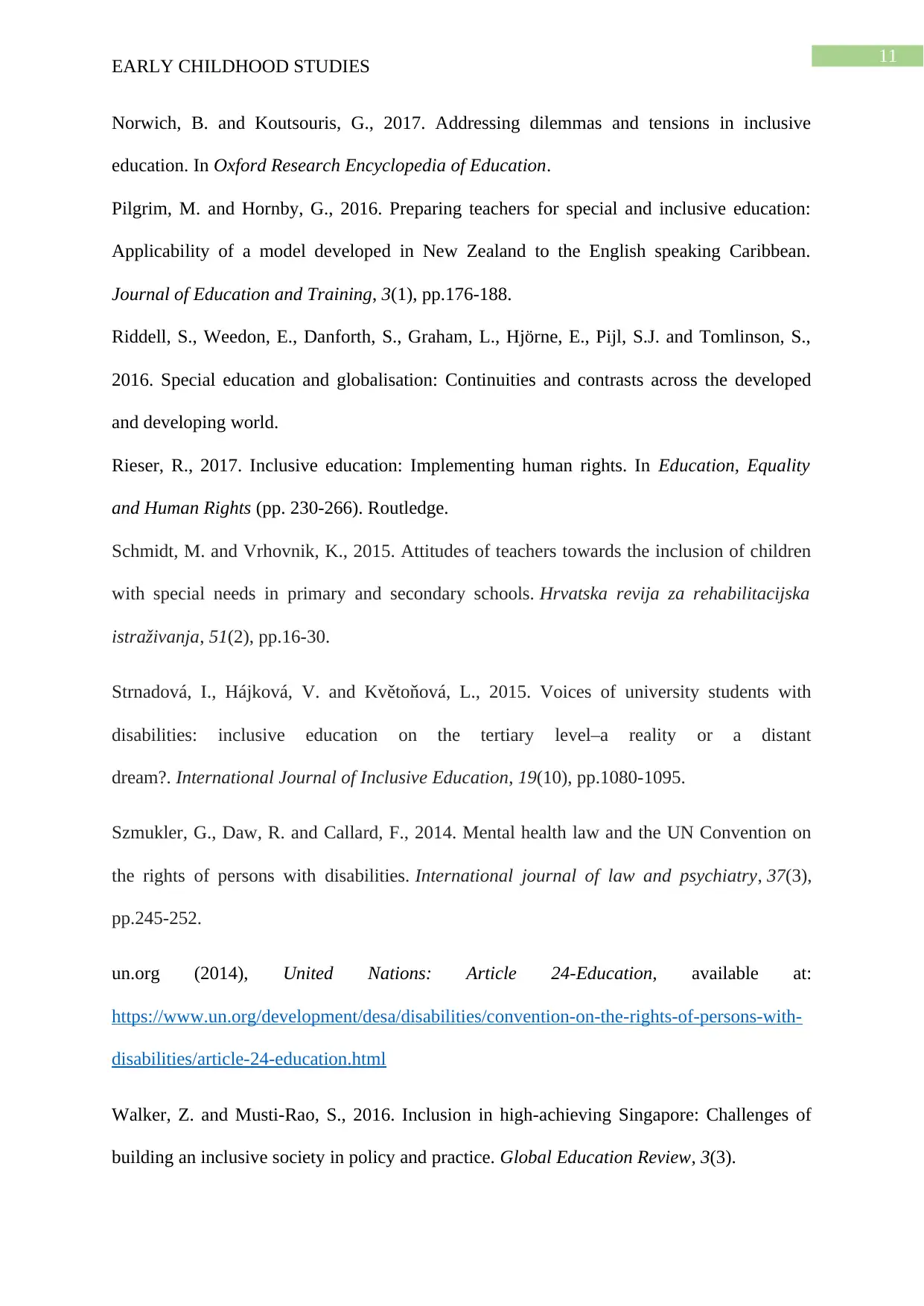
11
EARLY CHILDHOOD STUDIES
Norwich, B. and Koutsouris, G., 2017. Addressing dilemmas and tensions in inclusive
education. In Oxford Research Encyclopedia of Education.
Pilgrim, M. and Hornby, G., 2016. Preparing teachers for special and inclusive education:
Applicability of a model developed in New Zealand to the English speaking Caribbean.
Journal of Education and Training, 3(1), pp.176-188.
Riddell, S., Weedon, E., Danforth, S., Graham, L., Hjörne, E., Pijl, S.J. and Tomlinson, S.,
2016. Special education and globalisation: Continuities and contrasts across the developed
and developing world.
Rieser, R., 2017. Inclusive education: Implementing human rights. In Education, Equality
and Human Rights (pp. 230-266). Routledge.
Schmidt, M. and Vrhovnik, K., 2015. Attitudes of teachers towards the inclusion of children
with special needs in primary and secondary schools. Hrvatska revija za rehabilitacijska
istraživanja, 51(2), pp.16-30.
Strnadová, I., Hájková, V. and Květoňová, L., 2015. Voices of university students with
disabilities: inclusive education on the tertiary level–a reality or a distant
dream?. International Journal of Inclusive Education, 19(10), pp.1080-1095.
Szmukler, G., Daw, R. and Callard, F., 2014. Mental health law and the UN Convention on
the rights of persons with disabilities. International journal of law and psychiatry, 37(3),
pp.245-252.
un.org (2014), United Nations: Article 24-Education, available at:
https://www.un.org/development/desa/disabilities/convention-on-the-rights-of-persons-with-
disabilities/article-24-education.html
Walker, Z. and Musti-Rao, S., 2016. Inclusion in high-achieving Singapore: Challenges of
building an inclusive society in policy and practice. Global Education Review, 3(3).
EARLY CHILDHOOD STUDIES
Norwich, B. and Koutsouris, G., 2017. Addressing dilemmas and tensions in inclusive
education. In Oxford Research Encyclopedia of Education.
Pilgrim, M. and Hornby, G., 2016. Preparing teachers for special and inclusive education:
Applicability of a model developed in New Zealand to the English speaking Caribbean.
Journal of Education and Training, 3(1), pp.176-188.
Riddell, S., Weedon, E., Danforth, S., Graham, L., Hjörne, E., Pijl, S.J. and Tomlinson, S.,
2016. Special education and globalisation: Continuities and contrasts across the developed
and developing world.
Rieser, R., 2017. Inclusive education: Implementing human rights. In Education, Equality
and Human Rights (pp. 230-266). Routledge.
Schmidt, M. and Vrhovnik, K., 2015. Attitudes of teachers towards the inclusion of children
with special needs in primary and secondary schools. Hrvatska revija za rehabilitacijska
istraživanja, 51(2), pp.16-30.
Strnadová, I., Hájková, V. and Květoňová, L., 2015. Voices of university students with
disabilities: inclusive education on the tertiary level–a reality or a distant
dream?. International Journal of Inclusive Education, 19(10), pp.1080-1095.
Szmukler, G., Daw, R. and Callard, F., 2014. Mental health law and the UN Convention on
the rights of persons with disabilities. International journal of law and psychiatry, 37(3),
pp.245-252.
un.org (2014), United Nations: Article 24-Education, available at:
https://www.un.org/development/desa/disabilities/convention-on-the-rights-of-persons-with-
disabilities/article-24-education.html
Walker, Z. and Musti-Rao, S., 2016. Inclusion in high-achieving Singapore: Challenges of
building an inclusive society in policy and practice. Global Education Review, 3(3).
⊘ This is a preview!⊘
Do you want full access?
Subscribe today to unlock all pages.

Trusted by 1+ million students worldwide
1 out of 13
Related Documents
Your All-in-One AI-Powered Toolkit for Academic Success.
+13062052269
info@desklib.com
Available 24*7 on WhatsApp / Email
![[object Object]](/_next/static/media/star-bottom.7253800d.svg)
Unlock your academic potential
Copyright © 2020–2025 A2Z Services. All Rights Reserved. Developed and managed by ZUCOL.





